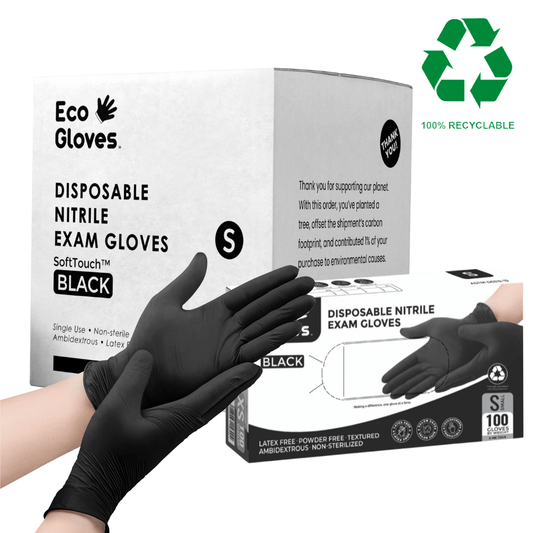Why Beach Cleanups are Important and How You Can Help
Eco Gloves
Marine debris, also known as marine litter, is a pressing global issue that poses significant threats to our oceans, marine life, and coastal ecosystems. It refers to any form of human-created waste that finds its way into the marine environment, including plastic bottles, fishing gear, cigarette butts, food wrappers, and more. The accumulation of marine debris has reached alarming levels, and its consequences are devastating.
Topics Covered
- The Menace of Plastic Pollution
- Devastating Consequences for Marine Life
- Disruption and Harm of Habitat
- Impact on Coastal Communities and Economies
- Addressing the Problem
- Key Takeaways: Why Beach Cleanups Matter and How You Can Make a Difference
- Frequently Asked Questions About Beach Cleanups and Marine Debris
The Menace of Plastic Pollution
One of the primary culprits of marine debris is plastic pollution. Plastics are lightweight, durable, and versatile, making them widely used in various industries. However, their improper disposal and poor waste management have led to vast amounts of plastic entering our oceans. Plastic debris not only persists for hundreds of years, but it also breaks down into smaller microplastics, which are ingested by marine organisms and can ultimately enter the food chain, posing risks to human health.
Devastating Consequences for Marine Life
Disruption and Harm of Habitat
Marine debris has severe consequences for marine life. Turtles, seabirds, fish, and marine mammals often mistake debris for food or become entangled in discarded fishing nets, ropes, and other debris. This can lead to injuries, suffocation, strangulation, and even death. The loss of marine species and the disruption of marine ecosystems have long-lasting ecological implications, affecting the delicate balance of our oceans.
Impact on Coastal Communities and Economies
Coastal communities and economies also suffer from the impacts of marine debris. Beaches covered in trash not only diminish the beauty of our coastal areas but also deter tourism, which is a vital source of income for many regions. The cleanup and removal of marine debris require significant resources, putting a strain on local governments and organizations working to combat the problem. Moreover, the economic losses associated with damaged fishing gear and reduced fish populations further exacerbate the issue.
Addressing the Problem
The generation of excessive waste increases the likelihood of marine debris. Addressing the problem of marine debris requires a multi-faceted approach.
International Cooperation is Key
International cooperation is also vital in combating marine debris. Since debris knows no boundaries, efforts to reduce its impact must transcend national borders. Collaboration among governments, organizations, and industries is necessary to develop and enforce regulations, promote research and innovation, and implement effective waste management strategies.
Businesses and Manufacturers Must Take Action
Businesses and manufacturers play a significant role in the plastic pollution problem, but they also have the power to be part of the solution. The production and distribution of plastic products contribute to the accumulation of plastic waste in our environment. Plastic, derived from fossil fuels such as crude oil and natural gas, also presents a significant environmental challenge due to its impact on greenhouse gas emissions. However, by adopting sustainable practices and taking proactive measures, they can help reduce this problem. Businesses can start by embracing the principles of the circular economy, designing products with recyclability and reusability in mind. They can also explore alternative packaging materials, prioritize the use of biodegradable or compostable plastics, and invest in research and development of innovative solutions. Furthermore, implementing responsible waste management strategies within their operations, such as proper disposal and recycling programs, can prevent plastic from ending up in our oceans and ecosystems. By taking these steps, businesses and manufacturers can demonstrate their commitment to environmental stewardship and contribute to a cleaner, healthier planet.
Individual Action Matters
Individual actions can make a difference as well. Each of us has the power to reduce our plastic consumption, participate in beach cleanups, and support initiatives that aim to address marine debris. By making conscious choices and advocating for change, we contribute to the preservation of our oceans and the well-being of future generations.

You can take the first step by becoming a mindful shopper. Prioritize thoughtful consideration before making a purchase. Ask yourself if the item is truly necessary. Is there a possibility of utilizing something you already own? Can you borrow or recycle the use of other products? Is it possible to buy it second-hand from a thrift or consignment store? Is there an option to purchase the item with minimal packaging? Can you buy it in larger quantities? Can you purchase a sustainable or eco-friendly version where the items will not end up in a landfill? Think compostable or fast biodegrading products. If not, are there viable alternatives available with reduced packaging or packaging that can be easily composted or recycled, such as cardboard or glass? Is it worth investing in a reusable item to replace a disposable one? Can you find a durable item that can be repeatedly reused or repurposed? Finally, if the item is disposable and cannot be reused, ensure that it and/or its packaging are recyclable.
Again, asking these questions before purchasing is one way to start making an impact. Here are just a few more ideas to continue supporting the effort:
- Reduce plastic consumption.
- Opt for reusable products or products made from recycled, plant-based, biodegradable materials with little or no packaging.
- Refuse disposables, reduce, reuse, and recycle (in that order) at home, work and school.
- Keep storm drains clean - they drain to waterways and the ocean.
- Don't throw trash onto the street or into bodies of water.
- Support businesses that put sustainability at the forefront of their mission.
- Participate in beach cleanups. Such as Coastal Cleanup Day, Adopt-A-Beach®, the Schoolyard Cleanup Program, or conduct your own Neighborhood Cleanup.
- Raise awareness and promote responsible waste management practices on land.
- Practice proper waste disposal, recycling, and reducing single-use plastics.
- Support education campaigns, community engagement, and policy changes that can contribute to a more sustainable and litter-free future.
- Support initiatives that contribute to a sustainable future.
In conclusion, marine debris poses a significant threat to our oceans and marine ecosystems. Plastic pollution and other forms of waste endanger marine life, harm coastal communities, and negatively impact the global economy. Tackling this problem requires collective action, including responsible waste management practices, international cooperation, and individual engagement. Only by working together can we hope to mitigate the problem of marine debris and ensure the long-term health and vitality of our precious marine environments.
Key Takeaways: Why Beach Cleanups Matter and How You Can Make a Difference
-
Marine Debris is a Global Crisis: Plastic bottles, fishing gear, and other human-made waste are harming marine life, disrupting ecosystems, and polluting coastlines.
-
Plastic Pollution is Persistent: Plastics can take hundreds of years to break down, releasing microplastics that enter the food chain and pose health risks to humans.
-
Wildlife at Risk: Sea turtles, birds, fish, and marine mammals can mistake trash for food or become entangled, leading to injury or death.
-
Economic & Community Impact: Littered beaches deter tourism, harm local economies, and increase cleanup costs for communities.
-
Collective Action is Essential: Governments, businesses, and individuals must work together to reduce waste, improve recycling, and adopt sustainable practices.
-
Every Individual Can Help: From reducing single-use plastics to participating in local cleanups, small actions add up to big change for our oceans.
👉 Eco Gloves proudly supports environmental cleanup efforts by providing sustainable disposable gloves—empowering volunteers to protect their hands while protecting the planet.
Frequently Asked Questions About Beach Cleanups and Marine Debris
-
Why are beach cleanups important?
They remove harmful debris before it can enter or further damage marine ecosystems, protecting wildlife, human health, and local economies.
-
How does plastic pollution affect marine life?
Animals can ingest or become entangled in plastic waste, leading to injuries, suffocation, starvation, or death.
-
What role do businesses play in reducing marine debris?
Businesses can adopt sustainable packaging, use compostable materials, design products for reuse or recycling, and implement responsible waste management practices.
-
What can I personally do to help?
Reduce single-use plastics, choose reusable items, recycle properly, keep storm drains clean, and participate in community or coastal cleanups.
-
Are there eco-friendly gloves for cleanups?
Yes. Eco Gloves offers compostable and biodegradable glove options that protect your hands during cleanups while minimizing environmental impact after disposal.
Further Reading:
-
What are Recyclable Gloves?
- The Essential Guide to Recycling Disposable Gloves
- How to Properly Care For and Dispose of Gloves















